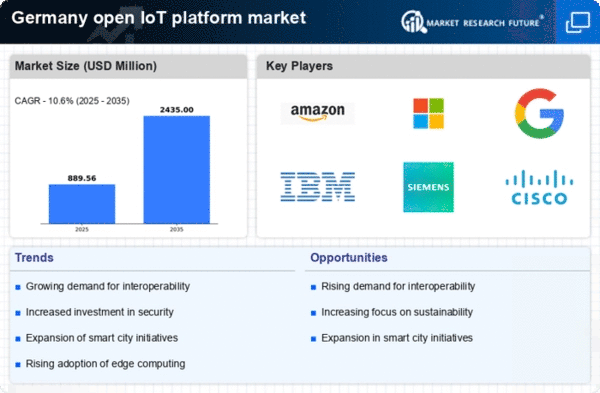Regulatory Support for IoT Innovations
In Germany, regulatory frameworks are increasingly supportive of IoT innovations, which is a crucial driver for the open iot-platform market. The government has implemented policies aimed at fostering technological advancements and ensuring data protection. For instance, the Digital Strategy 2025 outlines initiatives to promote IoT adoption across various sectors, including manufacturing and healthcare. This regulatory environment encourages businesses to invest in open iot-platform solutions, as compliance with regulations becomes more manageable. The open iot-platform market stands to gain from this supportive landscape, as it facilitates the development of innovative applications that align with regulatory standards.
Growing Demand for Smart Infrastructure
The open iot-platform market in Germany is experiencing a notable surge in demand for smart infrastructure solutions. This trend is driven by the increasing need for efficient energy management and urban planning. As cities evolve into smart cities, the integration of IoT platforms becomes essential for managing resources effectively. According to recent data, investments in smart infrastructure are projected to reach €50 billion by 2026, indicating a robust growth trajectory. The open iot-platform market is positioned to benefit significantly from this trend, as it enables seamless connectivity and data exchange among various smart devices, enhancing operational efficiency and sustainability.
Rising Adoption of Industry 4.0 Practices
The open iot-platform market is significantly influenced by the rising adoption of Industry 4.0 practices in Germany. As manufacturers increasingly embrace automation and data exchange, the demand for open IoT solutions is expected to grow. Industry 4.0 emphasizes the interconnectivity of machines and systems, which necessitates robust IoT platforms for real-time data analytics and decision-making. Recent statistics indicate that over 70% of German manufacturers are investing in IoT technologies to enhance productivity and reduce operational costs. This trend presents a substantial opportunity for the open iot-platform market, as it provides the necessary infrastructure for seamless integration and communication among devices.
Increased Focus on Sustainability Initiatives
Sustainability has become a pivotal concern in Germany, driving the open iot-platform market towards innovative solutions that promote environmental responsibility. The German government has set ambitious targets for reducing carbon emissions, which necessitates the adoption of smart technologies. Open IoT platforms play a vital role in monitoring and managing energy consumption, waste management, and resource allocation. As organizations strive to meet sustainability goals, the market for open IoT solutions is expected to expand. The open iot-platform market is likely to see increased investments, as businesses recognize the potential for IoT technologies to contribute to their sustainability initiatives.
Emergence of Advanced Analytics and AI Integration
The integration of advanced analytics and artificial intelligence (AI) into open IoT platforms is emerging as a key driver in Germany. Businesses are increasingly leveraging data analytics to derive actionable insights from IoT-generated data. This trend enhances operational efficiency and enables predictive maintenance, which is particularly valuable in manufacturing and logistics sectors. The open iot-platform market is poised to benefit from this technological evolution, as companies seek platforms that can support AI capabilities. With the potential to improve decision-making processes and reduce downtime, the demand for such integrated solutions is likely to rise, further propelling the growth of the open iot-platform market.
















